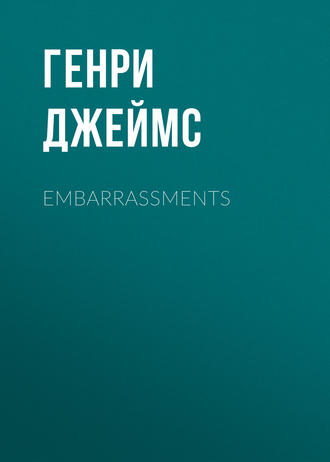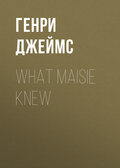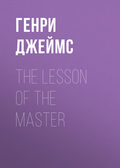
Генри Джеймс
Embarrassments
VII
It was my theory, my conviction, it became, as I may say, my attitude, that they had still never “met;” and it was just on this ground that I said to myself it would be generous to ask him to stand with me beside her grave. He did so, very modestly and tenderly, and I assumed, though he himself clearly cared nothing for the danger, that the solemnity of the occasion, largely made up of persons who had known them both and had a sense of the long joke, would sufficiently deprive his presence of all light association. On the question of what had happened the evening of her death little more passed between us; I had been overtaken by a horror of the element of evidence. It seemed gross and prying on either hypothesis. He, on his side, had none to produce, none at least but a statement of his house-porter—on his own admission a most casual and intermittent personage—that between the hours of ten o’clock and midnight no less than three ladies in deep black had flitted in and out of the place. This proved far too much; we had neither of us any use for three. He knew that I considered I had accounted for every fragment of her time, and we dropped the matter as settled; we abstained from further discussion. What I knew however was that he abstained to please me rather than because he yielded to my reasons. He didn’t yield—he was only indulgent; he clung to his interpretation because he liked it better. He liked it better, I held, because it had more to say to his vanity. That, in a similar position, would not have been its effect on me, though I had doubtless quite as much; but these are things of individual humour, as to which no person can judge for another. I should have supposed it more gratifying to be the subject of one of those inexplicable occurrences that are chronicled in thrilling books and disputed about at learned meetings; I could conceive, on the part of a being just engulfed in the infinite and still vibrating with human emotion, of nothing more fine and pure, more high and august than such an impulse of reparation, of admonition or even of curiosity. That was beautiful, if one would, and I should in his place have thought more of myself for being so distinguished. It was public that he had already, that he had long been distinguished, and what was this in itself but almost a proof? Each of the strange visitations contributed to establish the other. He had a different feeling; but he had also, I hasten to add, an unmistakable desire not to make a stand or, as they say, a fuss about it. I might believe what I liked—the more so that the whole thing was in a manner a mystery of my producing. It was an event of my history, a puzzle of my consciousness, not of his; therefore he would take about it any tone that struck me as convenient. We had both at all events other business on hand; we were pressed with preparations for our marriage.
Mine were assuredly urgent, but I found as the days went on that to believe what I “liked” was to believe what I was more and more intimately convinced of. I found also that I didn’t like it so much as that came to, or that the pleasure at all events was far from being the cause of my conviction. My obsession, as I may really call it and as I began to perceive, refused to be elbowed away, as I had hoped, by my sense of paramount duties. If I had a great deal to do I had still more to think about, and the moment came when my occupations were gravely menaced by my thoughts. I see it all now, I feel it, I live it over. It’s terribly void of joy, it’s full indeed to overflowing of bitterness; and yet I must do myself justice—I couldn’t possibly be other than I was. The same strange impressions, had I to meet them again, would produce the same deep anguish, the same sharp doubts, the same still sharper certainties. Oh, it’s all easier to remember than to write, but even if I could retrace the business hour by hour, could find terms for the inexpressible, the ugliness and the pain would quickly stay my hand. Let me then note very simply and briefly that a week before our wedding-day, three weeks after her death, I became fully aware that I had something very serious to look in the face, and that if I was to make this effort I must make it on the spot and before another hour should elapse. My unextinguished jealousy—that was the Medusa-mask. It hadn’t died with her death, it had lividly survived, and it was fed by suspicions unspeakable. They would be unspeakable to-day, that is, if I hadn’t felt the sharp need of uttering them at the time.
This need took possession of me—to save me, as it appeared, from my fate. When once it had done so I saw—in the urgency of the case, the diminishing hours and shrinking interval—only one issue, that of absolute promptness and frankness. I could at least not do him the wrong of delaying another day, I could at least treat my difficulty as too fine for a subterfuge. Therefore very quietly, but none the less abruptly and hideously, I put it before him on a certain evening that we must reconsider our situation and recognise that it had completely altered.
He stared bravely. “How has it altered?” “Another person has come between us.” He hesitated a moment. “I won’t pretend not to know whom you mean.” He smiled in pity for my aberration, but he meant to be kind. “A woman dead and buried!”
“She’s buried, but she’s not dead. She’s dead for the world—she’s dead for me. But she’s not dead for you.”
“You hark back to the different construction we put on her appearance that evening?”
“No,” I answered, “I hark back to nothing. I’ve no need of it. I’ve more than enough with what’s before me.”
“And pray, darling, what is that?”
“You’re completely changed.”
“By that absurdity?” he laughed.
“Not so much by that one as by other absurdities that have followed it.”
“And what may they have been?”
We had faced each other fairly, with eyes that didn’t flinch; but his had a dim, strange light, and my certitude triumphed in his perceptible paleness. “Do you really pretend,” I asked, “not to know what they are?”
“My dear child,” he replied, “you describe them too sketchily!”
I considered a moment. “One may well be embarrassed to finish the picture! But from that point of view—and from the beginning—what was ever more embarrassing than your idiosyncrasy?”
He was extremely vague. “My idiosyncrasy?”
“Your notorious, your peculiar power.”
He gave a great shrug of impatience, a groan of overdone disdain. “Oh, my peculiar power!”
“Your accessibility to forms of life,” I coldly went on, “your command of impressions, appearances, contacts closed—for our gain or our loss—to the rest of us. That was originally a part of the deep interest with which you inspired me—one of the reasons I was amused, I was indeed positively proud to know you. It was a magnificent distinction; it’s a magnificent distinction still. But of course I had no prevision then of the way it would operate now; and even had that been the case I should have had none of the extraordinary way in which its action would affect me.”
“To what in the name of goodness,” he pleadingly inquired, “are you fantastically alluding?” Then as I remained silent, gathering a tone for my charge, “How in the world does it operate?” he went on; “and how in the world are you affected?”
“She missed you for five years,” I said, “but she never misses you now. You’re making it up!”
“Making it up?” He had begun to turn from white to red.
“You see her—you see her: you see her every night!” He gave a loud sound of derision, but it was not a genuine one. “She comes to you as she came that evening,” I declared; “having tried it she found she liked it!” I was able, with God’s help, to speak without blind passion or vulgar violence; but those were the exact words—and far from “sketchy” they then appeared to me—that I uttered. He had turned away in his laughter, clapping his hands at my folly, but in an instant he faced me again, with a change of expression that struck me. “Do you dare to deny,” I asked, “that you habitually see her?”
He had taken the line of indulgence, of meeting me halfway and kindly humouring me. At all events, to my astonishment, he suddenly said: “Well, my dear, what if I do?”
“It’s your natural right; it belongs to your constitution and to your wonderful, if not perhaps quite enviable fortune. But you will easily understand that it separates us. I unconditionally release you.”
“Release me?”
“You must choose between me and her.”
He looked at me hard. “I see.” Then he walked away a little, as if grasping what I had said and thinking how he had best treat it. At last he turned upon me afresh. “How on earth do you know such an awfully private thing?”
“You mean because you’ve tried so hard to hide it? It is awfully private, and you may believe I shall never betray you. You’ve done your best, you’ve acted your part, you’ve behaved, poor dear! loyally and admirably. Therefore I’ve watched you in silence, playing my part too; I’ve noted every drop in your voice, every absence in your eyes, every effort in your indifferent hand: I’ve waited till I was utterly sure and miserably unhappy. How can you hide it when you’re abjectly in love with her, when you’re sick almost to death with the joy of what she gives you?” I checked his quick protest with a quicker gesture. “You love her as you’ve never loved, and, passion for passion, she gives it straight back! She rules you, she holds you, she has you all! A woman, in such a case as mine, divines and feels and sees; she’s not an idiot who has to be credibly informed. You come to me mechanically, compunctiously, with the dregs of your tenderness and the remnant of your life. I can renounce you, but I can’t share you; the best of you is hers; I know what it is and I freely give you up to her for ever!”
He made a gallant fight, but it couldn’t be patched up; he repeated his denial, he retracted his admission, he ridiculed my charge, of which I freely granted him moreover the indefensible extravagance. I didn’t pretend for a moment that we were talking of common things; I didn’t pretend for a moment that he and she were common people. Pray, if they had been, how should I ever have cared for them? They had enjoyed a rare extension of being and they had caught me up in their flight; only I couldn’t breathe in such an air and I promptly asked to be set down. Everything in the facts was monstrous, and most of all my lucid perception of them; the only thing allied to nature and truth was my having to act on that perception. I felt after I had spoken in this sense that my assurance was complete; nothing had been wanting to it but the sight of my effect on him. He disguised indeed the effect in a cloud of chaff, a diversion that gained him time and covered his retreat. He challenged my sincerity, my sanity, almost my humanity, and that of course widened our breach and confirmed our rupture. He did everything in short but convince me either that I was wrong or that he was unhappy; we separated, and I left him to his inconceivable communion.
He never married, any more than I’ve done. When six years later, in solitude and silence, I heard of his death I hailed it as a direct contribution to my theory. It was sudden, it was never properly accounted for, it was surrounded by circumstances in which—for oh, I took them to pieces!—I distinctly read an intention, the mark of his own hidden hand. It was the result of a long necessity, of an unquenchable desire. To say exactly what I mean, it was a response to an irresistible call.







